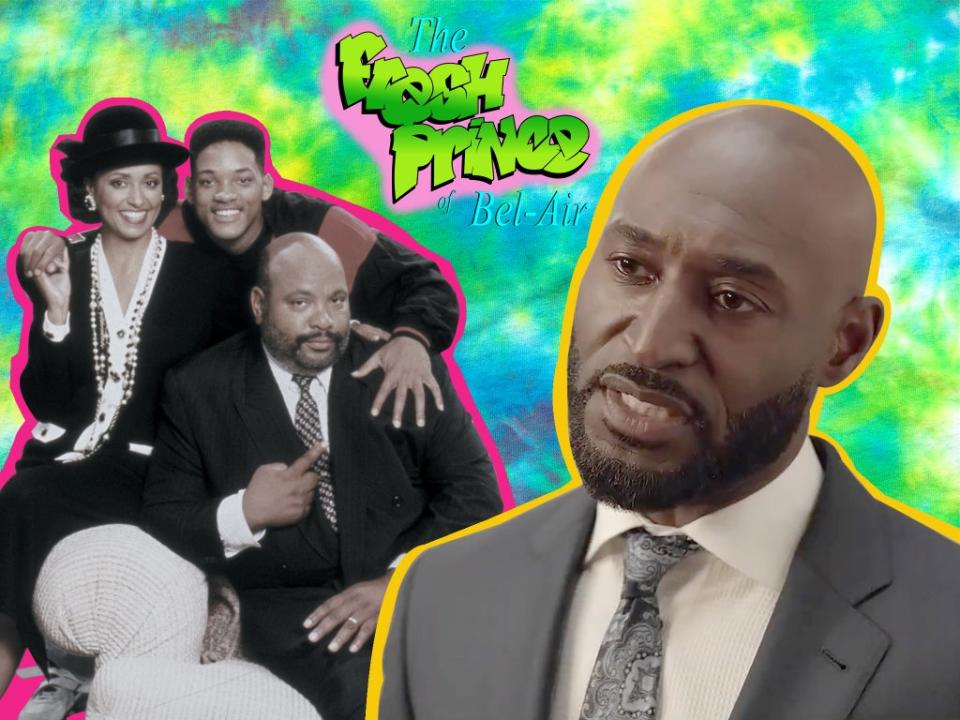A thin Uncle Phil? Why the Fresh Prince reboot Bel Air is a slap in the face for bigger men

Like many British millennials, I have sacred memories of late afternoons in the early Noughties, when BBC Two laid on The Simpsons and The Fresh Prince of Bel Air back to back. This holy one-two of family friendly American entertainment has never been bettered. So I watched the trailer for the rebooted more “grown up” version of Fresh Prince, Bel-Air, with the nervous hope of someone checking a bottle of milk to see if it had gone off. Remaking beloved programmes is a risky business. They tend to be at best pointless, and at worst enough to retrospectively diminish your impression of the original.
Sadly, any critical faculties I have were rendered mute. Watching the trailer, I could only manage a single thought: what the hell have they done to Uncle Phil? Played by James Avery, Uncle Phil was a big character, literally and figuratively. He had a hearty appetite and the girth to prove it. It fit his character. Without wishing to pretend this was the kind of thing I reflected on much after school when I was 10, I think as someone prone to a little softness around the edges I found Uncle Phil subconsciously reassuring. Here was a bloke who was powerful, popular, professionally successful, and romantically attractive, albeit not all of them and not all at the same time.
If Will (as in, Smith) was the prince, Phil was the king. Whatever scrapes Will, Carlton and the rest got themselves into, Phil was always there to bail them out. Sure, Phil could be stern, and he had a temper, but it was always for the right reasons. He was ambitious for his children, anxious that the privilege afforded by his professional success would not impede them from making the best of themselves. If he was framed as Will’s antagonist, that was more to do with Will’s immaturity than any malice on Phil’s part.
At heart, Phil was a deeply kind man, a male role model for Will who gave refuge to his miscreant nephew after he got in one little fight in Philadelphia and his mother worried for his future. Uncle Phil was rich and had put himself up in a White House-looking mansion in one of the fanciest neighbourhoods in America. But he was no trustafarian. He was a self-made man, a Princeton and Harvard graduate, a lawyer with a proud history of involvement in the civil rights movement. He embodied the American dream. He believed in waking up in the morning, dressing the part and working hard, an archetypal Reaganite. Uncle Phil was prosperity, inside and out. No longer. In the new trailer, Phil, now played by Adrian Holmes, is decidedly trim, broad of shoulder but narrow of waist. Publicity photos highlight the actor’s bulging guns. It’s an outrage. Uncle Phil should not have guns.
We shouldn’t be surprised. Gradually, the big men are being winnowed out of TV. There was a time when you hardly move for them. Mark Addy in Still Standing; John Goodman in Roseanne; Jackie Gleason in The Honeymooners; Kevin James in The King of Queens; Jim O’Heir in Parks and Recreation, James Gandolfini in The Sopranos. They all exerted a kind of large dad authority. Uncle Phil’s weight was occasionally the subject of teasing from the younger generation, and he did suffer a massive heart attack, but it was never a moral failing. He was just a big dude, his size a part of him but far from his only quality. This seems like a healthier message than the current situation on TV, where everyone looks like they have been sculpted by Michelangelo except for one or two fat exceptions, whose stories are all about their size, one way or another.
For all the talk of body positivity and diversity, big guys are rarer than ever. When Modern Family finished in 2020, taking with it Eric Stonestreet’s cuddly icon Cameron Tucker, so too did the most prominent live-action big dad. The remaining big dads tend to be animated. Think of Homer Simpson, Peter Griffin, or Peppa’s useless Daddy Pig who gets stuck in the soft play area. It’s easier for dads to be fat in cartoons, where it can be a purely comic device and their weight doesn’t invite sanctimonious worries about the actor’s health.
As with his dark analogue Tony Soprano, another patriarch of large appetites and firm family standards, in the original Fresh Prince, Uncle Phil’s size made sense. Now it’s out of time. In the era of Peloton and ultramarathons and keto diets, being overweight in wealthy American circles is tantamount to failure of character. Nowhere is this truer than California, where tech tycoons and LA media titans measure their body fat to the last percentage point. We mustn’t put all the blame on society. Actors tend not to be large. And there’s no particular reason why Uncle Phil has to be fat. It’s just that he was. This is the problem with remakes, and with worrying too much about your weight: you have to remember there are plenty of people who love you just the way you are. And that’s just the kind of cutesy little moral Uncle Phil would have hated.

 Yahoo Movies
Yahoo Movies 